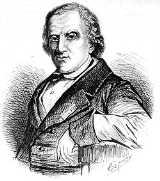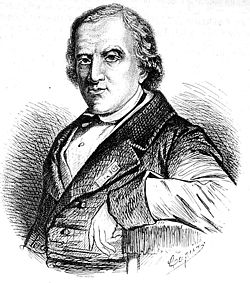
François-Vincent Raspail
Encyclopedia

France
The French Republic , The French Republic , The French Republic , (commonly known as France , is a unitary semi-presidential republic in Western Europe with several overseas territories and islands located on other continents and in the Indian, Pacific, and Atlantic oceans. Metropolitan France...
chemist
Chemist
A chemist is a scientist trained in the study of chemistry. Chemists study the composition of matter and its properties such as density and acidity. Chemists carefully describe the properties they study in terms of quantities, with detail on the level of molecules and their component atoms...
, naturalist
Naturalist
Naturalist may refer to:* Practitioner of natural history* Conservationist* Advocate of naturalism * Naturalist , autobiography-See also:* The American Naturalist, periodical* Naturalism...
, physiologist, and socialist politician.
Biography
Raspail was born in CarpentrasCarpentras
Carpentras is a commune in the Vaucluse department in the Provence-Alpes-Côte d'Azur region in southeastern France.It stands on the banks of the Auzon...
, Vaucluse
Vaucluse
The Vaucluse is a department in the southeast of France, named after the famous spring, the Fontaine-de-Vaucluse.- History :Vaucluse was created on 12 August 1793 out of parts of the departments of Bouches-du-Rhône, Drôme, and Basses-Alpes...
. A member of the republican
Republicanism
Republicanism is the ideology of governing a nation as a republic, where the head of state is appointed by means other than heredity, often elections. The exact meaning of republicanism varies depending on the cultural and historical context...
Carbonari
Carbonari
The Carbonari were groups of secret revolutionary societies founded in early 19th-century Italy. The Italian Carbonari may have further influenced other revolutionary groups in Spain, France, Portugal and possibly Russia. Although their goals often had a patriotic and liberal focus, they lacked a...
society, Raspail was imprisoned during Louis Philippe
Louis-Philippe of France
Louis Philippe I was King of the French from 1830 to 1848 in what was known as the July Monarchy. His father was a duke who supported the French Revolution but was nevertheless guillotined. Louis Philippe fled France as a young man and spent 21 years in exile, including considerable time in the...
's reign (1830-1848) and was a candidate for presidency of the Second Republic
French Second Republic
The French Second Republic was the republican government of France between the 1848 Revolution and the coup by Louis-Napoléon Bonaparte which initiated the Second Empire. It officially adopted the motto Liberté, Égalité, Fraternité...
in December 1848. However, he was then involved in the attempted revolt of 15 May 1848 and in March 1849 was again imprisoned as a result. After Louis Napoleon
Napoleon III of France
Louis-Napoléon Bonaparte was the President of the French Second Republic and as Napoleon III, the ruler of the Second French Empire. He was the nephew and heir of Napoleon I, christened as Charles Louis Napoléon Bonaparte...
's 2 December 1851 coup his sentence was commuted to exile, from which he returned to France only in 1862. In 1869, during the liberal phase of the Second Empire
Second French Empire
The Second French Empire or French Empire was the Imperial Bonapartist regime of Napoleon III from 1852 to 1870, between the Second Republic and the Third Republic, in France.-Rule of Napoleon III:...
(1851-1870), he was elected deputy from Lyons
Lyon
Lyon , is a city in east-central France in the Rhône-Alpes region, situated between Paris and Marseille. Lyon is located at from Paris, from Marseille, from Geneva, from Turin, and from Barcelona. The residents of the city are called Lyonnais....
. He remained a popular republican during the French Third Republic
French Third Republic
The French Third Republic was the republican government of France from 1870, when the Second French Empire collapsed due to the French defeat in the Franco-Prussian War, to 1940, when France was overrun by Nazi Germany during World War II, resulting in the German and Italian occupations of France...
, after the short-term Paris Commune
Paris Commune
The Paris Commune was a government that briefly ruled Paris from March 18 to May 28, 1871. It existed before the split between anarchists and Marxists had taken place, and it is hailed by both groups as the first assumption of power by the working class during the Industrial Revolution...
in 1871.
His sons, Benjamin
Benjamin Raspail
Benjamin Raspail , was a painter-engraver and politician of the French Third Republic.He was the son of François-Vincent Raspail...
(eldest), François, Xavier (youngest) and Émile, were also all notable figures in the Third Republic.
Scientific achievements
Raspail was one of the founders of the cell theoryCell theory
Cell theory refers to the idea that cells are the basic unit of structure in every living thing. Development of this theory during the mid 17th century was made possible by advances in microscopy. This theory is one of the foundations of biology...
in biology
Biology
Biology is a natural science concerned with the study of life and living organisms, including their structure, function, growth, origin, evolution, distribution, and taxonomy. Biology is a vast subject containing many subdivisions, topics, and disciplines...
. He coined the phrase omnis cellula e cellula ("every cell is derived from a [preexisting] cell") later attributed to Rudolf Karl Virchow
Rudolf Virchow
Rudolph Carl Virchow was a German doctor, anthropologist, pathologist, prehistorian, biologist and politician, known for his advancement of public health...
. He was an early proponent of the use of the microscope
Microscope
A microscope is an instrument used to see objects that are too small for the naked eye. The science of investigating small objects using such an instrument is called microscopy...
in the study of plants. He was also an early advocate of the use of antisepsis and better sanitation and diet.
Entry into politics
After the revolution of 1830July Revolution
The French Revolution of 1830, also known as the July Revolution or in French, saw the overthrow of King Charles X of France, the French Bourbon monarch, and the ascent of his cousin Louis-Philippe, Duke of Orléans, who himself, after 18 precarious years on the throne, would in turn be overthrown...
, Raspail became involved in politics. He was President of the Human Rights Society, and was imprisoned for that role. While in prison, he tended sick inmates, and studied their diseases. He became convinced of the value of camphor
Camphor
Camphor is a waxy, white or transparent solid with a strong, aromatic odor. It is a terpenoid with the chemical formula C10H16O. It is found in wood of the camphor laurel , a large evergreen tree found in Asia and also of Dryobalanops aromatica, a giant of the Bornean forests...
, which he believed worked by killing extremely small parasites -- a version of the germ theory of disease
Germ theory of disease
The germ theory of disease, also called the pathogenic theory of medicine, is a theory that proposes that microorganisms are the cause of many diseases...
.
Later career
Raspail was a candidate for the Presidency of the French Second RepublicFrench Second Republic
The French Second Republic was the republican government of France between the 1848 Revolution and the coup by Louis-Napoléon Bonaparte which initiated the Second Empire. It officially adopted the motto Liberté, Égalité, Fraternité...
in December 1848, but came in fourth, losing to Louis-Napoléon Bonaparte (Later Napoleon III). He had been involved in the attempted revolt of 15 May 1848, and in March 1849 was again imprisoned as a result. In 1853, Napoleon III
Napoleon III of France
Louis-Napoléon Bonaparte was the President of the French Second Republic and as Napoleon III, the ruler of the Second French Empire. He was the nephew and heir of Napoleon I, christened as Charles Louis Napoléon Bonaparte...
commuted his sentence of imprisonment to one of exile. He returned to France from exile in 1862. In 1869 he was elected deputy from Lyons and in 1875 from Marseilles. He remained popular and respected during the French Third Republic
French Third Republic
The French Third Republic was the republican government of France from 1870, when the Second French Empire collapsed due to the French defeat in the Franco-Prussian War, to 1940, when France was overrun by Nazi Germany during World War II, resulting in the German and Italian occupations of France...
. The longest boulevard in Paris, in the VIIe
VIIe arrondissement
The 7th arrondissement of Paris is one of the 20 arrondissements of the capital city of France. It includes some of Paris's major tourist attractions, such as the Eiffel Tower and the Hôtel des Invalides , and a concentration of such world famous museums as the Musée d'Orsay and the Musée du quai...
, VIe
VIe arrondissement
The 6th arrondissement of Paris is one of the 20 arrondissements of the capital city of France. It includes world famous educational institutions such as the École des Beaux-Arts de Paris and the Académie française, the seat of the French Senate as well as a concentration of some of Paris most...
and XIVe arrondissement
XIVe arrondissement
The 14th arrondissement of Paris is one of the 20 arrondissements of the capital city of France....
s, was named Boulevard Raspail
Boulevard Raspail
Boulevard Raspail is a boulevard of Paris, in France.Its orientation is north-south, and joins boulevard Saint-Germain with place Denfert-Rochereau whilst traversing 7th, 6th and 14th arrondissements...
in his honor, after which the Raspail Métro station
Raspail (Paris Metro)
Raspail is a station of the Paris Métro, serving Line 4 and Line 6 in the 14th arrondissement. The station is currently undergoing renovation works....
takes its name.
Publications
- Essai de chimie microscopique 1830
- Nouveau système de chimie organique 1833
- Manuel annuaire de la santé 1834, revisued annually
- Lettres sur les Prisons du Paris 1839
- Histoire naturelle de la santé 1843
- Le Réformateur (newspaper, published 1834-35)
For further reading
- Raspail: Scientist and Reformer by Dora B. Weiner (Columbia University Press, 1968)
External links
- François Vincent Raspail in the Encyclopedia of 1848 Revolutions
- Bibliopoly listing by A Gerits & Son
- Genius and Biographers: The Fictionalization of Evariste Galois (Mentions and quotes Raspail several times)
- Who named it -- Virchow's law
- Timeline for the Cell Theory
- archontology.org's page on Napoléon III, gives election results for 1848
- An example of the Raspail Simple Chemical Microscope made by Louis Joseph Deleuil

